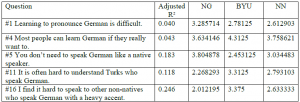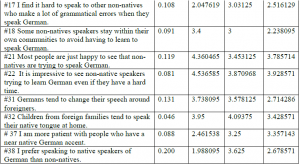Nicholas Kramer and Dr. Laura Smith, German/Slavic Department
Our research project has been a very exciting development, and although there is more to be done, we have accomplished a lot in the past year. Three different surveys, all of which had 40 questions, were written and distributed while I was on a study abroad in Berlin, Germany. The point of the surveys was to discover what personal language attitudes and biases towards foreigners were held. We investigated three groups of German speakers: native German speakers, non-native German speakers, and BYU students. Initially, we wanted to look at how language gains were affected by bias, but since the language gains research is still in progress, we are simply looking at the discrimination natives harbor for non-natives and non-natives harbor for non-natives.
I used the ORCA money to pay for the flight to the Tegel airport in Berlin, Germany and for the living expenses. While in Germany, I passed and collected surveys by means of a convenience sample amongst German and non-natives. It was fun approaching Germans in the marketplace, in restaurants, and on public transit. Non-natives were mainly contacted in restaurants and at the Goethe Institut where the BYU students were taking classes in German. Over 40 surveys were collected from native Germans, and around 30 surveys were collected from non-natives. There were around 35 BYU students and 32 fully participated in my survey and the language tasks performed by other undergraduate students.
After the study abroad, I put all the data in an excel file, and I arranged it so that each of the 40 questions could be tested against certain variables including age, education level, ethnicity, native origin, and overall second language experience. Dr. Wendy Baker Smemoe helped Dr. Smith and me by graciously running the statistics on our data. In fact, we are currently still running statistics on several research questions since we have had to change our thesis and research questions to adapt to the current circumstances of not having language-gains data. The following table shows which questions had statistically different answers amongst the three groups (based on a Likert scale of 1 = disagree and 5 = agree):
Currently, Dr. Smith and I are mulling over what the conclusions of the present data are, and we are waiting for more statistics on our more specific research questions. It has been an excellent process so far, and I will have a large portion of my honor’s thesis finished by the end of the semester.


